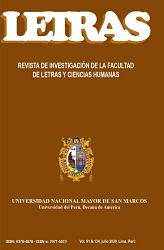Computational linguistics for revitalization and polyglotism
DOI:
https://doi.org/10.30920/letras.91.134.9Keywords:
Language planning, Language Technology, Endangered Languages, Language Economics, Language as a ResourceAbstract
Despite existing laws, in practice, the Peruvian State ignores multiculturalism and behaves as a monolingual and mono-cultural organization. Since this misguided paradigm is still in place, the state has not invested enough to develop language skills to serve all citizens equally. The consequences of this are the lack of promotion, discrimination and finally the isolation that leads to the extinction of our indigenous languages. Our initiative is to change the wrong paradigm, to awaken national pride for our native roots, and to do it on three different ways: to demonstrate that our languages can be used in the modern technological world as well as well-established languages, to demonstrate that our languages can carry culture and entertainment under contemporary canons and to demonstrate that our languages provide economic value to the nation, which justifies their preservation beyond rights. This document describes a roadmap for the development of computational linguistics of under-supported languages that are still spoken by millions of speakers. Such is the case of languages such as: Quechua, Aymara, Guaraní, Nahuatl, Mixtec, Otomi, Quiche, Mayan or Zapotec. Due to the massive presence of the speakers of these languages in the urban environment and their habitual use of the Internet and mobile telephony, we are committed to build corpora of these languages via online crowdsourcing.
Downloads
Published
Issue
Section
License
Copyright (c) 2020 Letras (Lima)

This work is licensed under a Creative Commons Attribution 4.0 International License.






